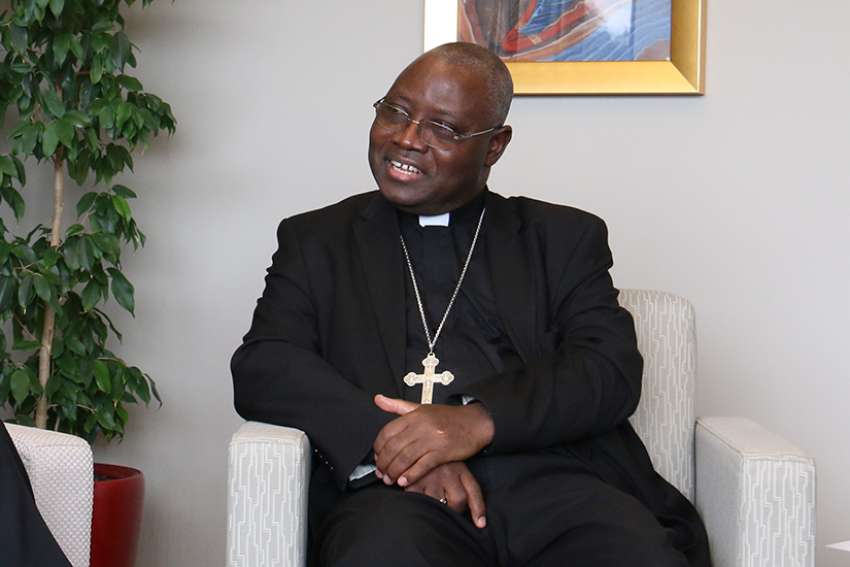“If there is anybody who should be advocating a violent response to Muslim attacks, it should be me,” he told The B.C. Catholic during his first visit to Canada June 7-14. “I have experienced it in my ethnic group and from my work as a priest. I should know. My people have died in front of me.”
In 2014, the world was shocked when more than 270 girls from the primarily Christian Nigerian town of Chibok were kidnapped by terrorist group Boko Haram, forced to convert and held for ransom.
It wasn’t an isolated incident, and violence, terrorism and corruption are still daily realities in Nigerian communities. In January, a mass funeral was held for 72 people killed during a fight between what appeared to be mostly Muslim cattle herders and mainly Christian farmers on New Year’s Day. About three months later, 19 Christians were killed when gunmen opened fire at Mass and set fire to about 50 homes in a remote village. Among the dead were two priests.
“It has always been a challenge. There has never been a peaceful moment,” said Kaigama, whose trip through several Canadian cities was sponsored by Aid to the Church in Need, a pontifical charity for Catholics suffering poverty or persecution.
Despite his anger, Kaigama says violence will only lead to more violence. So, since his ordination at the age of 36, he has been promoting peace and inter-religious dialogue. “Either we do something, or we perish together.”
The work has been incredibly difficult. The Archbishop of Jos said his people have been “allergic” to the concept of dialogue and feel as though talking with perpetrators means letting them off the hook.
He remembers when suicide bombers attacked a church in his archdiocese in 2012. It was a Sunday, the church had been full, and 14 were killed in the explosion.
“Everybody was so angry. They said: ‘Let’s fight. Let’s kill.’ They wanted the bishop to give the word. Everybody was very angry. They were even angry with the police and security agents. They felt betrayed.”
When Kaigama arrived at the scene, a local police commissioner stuck by his side, fearing the angry crowd.
“I could still see the remnants of the terrorists, the building was still on fire, there was smoke still there. So what do you do? Ask them to fight? They will begin to kill innocent passersby, anyone who looks like a Muslim,” he said.
“So, I told them: ‘Look, I am more angry than anybody here. If I had to do something, I would do something worse than any of you here. But what would we make of our religion? What is the core of our religion? Let us recite the Our Father.”
He continued: “There are 14 people dead now. If I say fight, by tomorrow we’ll have 50 or 100 dead, on both sides. So, who will gain?”
In 10 years, Kaigama has not held a eucharistic procession on the feast of Corpus Christi (or Christ the King), worried it would take only one Muslim unhappy with the procession to throw a stone and a bloodbath would start in the streets.
“A small thing, even a small problem, even just the young people could be angry about something, (but) if they start fighting and one is a Christian and one is a Muslim, it becomes a Christian-Muslim fight. People can die for that.”
Even local police and military can’t control the situation, said Kaigama. When he was the bishop of Jalingo, he was often called by soldiers to help them de-escalate a situation.
When he was ordained the Archbishop of Jos in 2000, he thought he was going to “take a good sabbatical,” but soon found the situation there was even more dramatic. “Whether I liked it or not, I had to be involved. It wasn’t a choice at all. I never studied anything to do with Islam or dialogue or justice issues.”
In this tense climate, Kaigama seeks ways to promote peace between Christians and Muslims. He has befriended local Muslim chiefs and opened a school where members of both faiths can get a free education in building or carpentry while learning how to get along.
“They are eating together, learning together, and they try to be friends and cultivate the discipline of sitting down when there is a problem, rather than taking a bow and arrow or a gun,” he said. “So, at least if in one village there is a crisis, and someone is able to say: ‘let’s reason, let’s talk’ — it’s better than nothing.”
(The B.C. Catholic)
Nigerian bishop promotes dialogue Muslims and Christians after years of violence
By Agnieszka Krawczynski, Canadian Catholic NewsVANCOUVER – In the 23 years since Archbishop Ignatius Kaigama became a bishop, he has not taken one day off from promoting dialogue and peace between Christians and Muslims.
Please support The Catholic Register
Unlike many media companies, The Catholic Register has never charged readers for access to the news and information on our website. We want to keep our award-winning journalism as widely available as possible. But we need your help.
For more than 125 years, The Register has been a trusted source of faith-based journalism. By making even a small donation you help ensure our future as an important voice in the Catholic Church. If you support the mission of Catholic journalism, please donate today. Thank you.
DONATE

